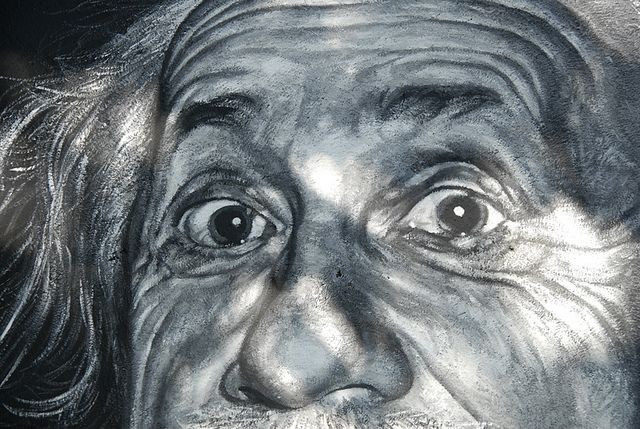What Genius Looks Like: The Common Traits Of The World’s Smartest And Most Creative

When we talk about geniuses, we tend to recall a familiar cast of characters — centuries-old figures like Benjamin Franklin, turn-of-the-century minds like Albert Einstein, and new-age geniuses like Steve Jobs, who are regarded for both their intellect as well as their creativity. For as loose an understanding as we may have of genius, our intuitions are strong when it comes to spotting it.
On paper, the world’s most imaginative, driven, innovative, and intelligent people are really quite different. Their temperaments swing from manic and erratic to solemn and stoic, and rarely do their bodies of work tell a similar story. But geniuses are a close-knit bunch for the certain qualities they do share. At once they are creatures of simplicity and solitude, who revel in the abstract and can often see, ruthlessly at times, what mere mortals never can.
The Three-Click Limit
Anecdotally, geniuses all seem to share a handful of traits. The biographer Walter Isaacson, who has profiled the lives of Franklin, Einstein, and Jobs, points out that inside geniuses’ heads is an intriguing mix of sensibilities. One the one hand, they crave beauty in simplicity. When he was designing the iPod, Steve Jobs demanded that users would never have to click more than three times to reach any song in the library. When his team came up with the idea for the scrolling wheel, they reached the goal in even fewer.
But as Isaacson mentions, for all his frequent bursts of utter coldness, Jobs was also committed to helping people break down personal barriers. "Steve was a real jerk to work with, but he gathered around him the most loyal people, because he drove them to do things they didn't know they could do," Isaacson said at the “7 Days of Genius Festival” held earlier this year.
Isaacson also singles out Jobs’ perfectionism as another symptom of genius. Noted fellow biographer, James Gleick, who’s captured the storied lives of physicists Sir Isaac Newton and Richard Feynman notes that while both men were polar opposites in a social sense — Newton very much the recluse, to Feynman the gregarious and fun-loving socialite — when it came time to work, solitude was king.
A Tendency for Depression
Time spent alone is seldom enjoyed, however. Research has repeatedly shown that when highly creative people, whether they are bohemian artists or rigorous scientists, are hard at work, their tendencies edge toward bipolar. A 2002 Stanford University study, for example, revealed that creative types are more likely to access a broader emotional range than the average person. While this can produce startling displays of innovation, such as Einstein’s theory of relativity or the exquisitely designed Macintosh computer, the dark side of emotional range often creeps through.
"My hunch is that emotional range, having an emotional broadband, is the bipolar patient's advantage," said Stanford researcher Connie Strong in a news release at the time. "It isn't the only thing going on, but something gives people with manic depression an edge, and I think it's emotional range." Other studies, most notably a 1993 study performed at Johns Hopkins University, have found that distinguished artists are 10 to 30 times more likely to suffer from manic depression and major depression.
This isn’t to say geniuses are necessarily suffering while they work. Often the greatest leaps in innovation come when geniuses are holed up in their heads. Johns Hopkins’ researcher Dr. Kay Redfield Jamison argues, however, that this may be little more than a mask for deeper ailments. “Those with manic depression can be very scarred and extremely confident at the same time,” she told The New York Times soon after the 1993 study’s release. “And it takes that hyperconfidence when you're breaking down borders in art and doing things that haven't been done before."
Going Forward, Together
In the end, of course, we don’t regard geniuses mainly for their mental health. Illnesses may be lurking in the shadows, but the hallmark of genius is a person’s output, not the bumpy road she took to get there. Geniuses stand out because they don’t just prefer greatness; they demand it. And if it doesn’t exist, they discover it.
Or they create it. Steve Jobs has said he never performed market research before launching the Macintosh because the public had no idea what it wanted. Now, Apple is one of the most valuable companies on the planet. But as Isaacson explains, genius isn’t a lonely road in the long run. Steve Jobs always found himself at the top of the food chain, but in his arsenal were dozens of engineers and designers along for the ride — a hive of diverse minds that created greatness together.
"Most creativity comes from a group of people who play off each other, who cover each other’s weaknesses, and amplify each other’s' strengths," Isaacson said. He recalls Ben Franklin, who helped unite the public and have them adopt a new, decidedly better, perspective. It was the genius that spotted what was important, but it was the mainstream that popularized it. "Over and over again you see Franklin's wisdom, which is bringing people together,” Isaacson said. “That's part of his genius."



























